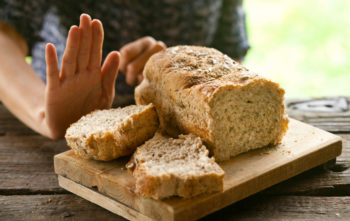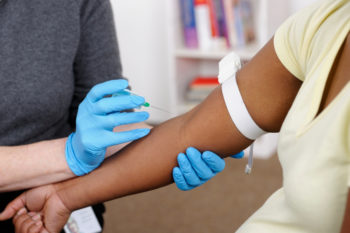Undiagnosed coeliac disease can make daily life a misery, not to mention the long-term health problems it causes, says Dr Sohail Butt, a GP with coeliac-disease expertise.
And, although it’s thought to affect roughly one in every 100 people around the world, only one in eight of those with the condition will be diagnosed with it, primarily due to a lack of awareness.

Pictures: iStock.
What is it?
Coeliac disease is an autoimmune disease triggered by an intolerance to the gluten protein in wheat, barley and rye, and, very occasionally, in oats too. The body responds by producing antibodies that attack and damage the tissues that line the small intestine.
As a result, the body can’t absorb essential nutrients, so you may suffer from anaemia due to an iron deficiency or start to lose bone density because your body isn’t getting enough calcium or vitamin D. We’re not sure what causes it, but triggers may include stress or pregnancy.
Why A Good Hip To Waist Ratio Is More Important Than Your BMI
Who gets it?
Although the disease can be developed and diagnosed at any age, it often emerges after weaning on to cereals that contain gluten. Because a delayed diagnosis is common, it is most frequently discovered in those aged between 40 and 50.
Family history is important too, as there is a genetic link to coeliac disease. Even though the genetics are complicated and are not completely understood, it’s known that if one person is diagnosed, there is a one in 10 chance that a close relative will have it too.
What are the symptoms?
Classically, patients suffer from diarrhoea for four to six weeks and then lose weight dramatically, but symptoms can be associated and confused with those of irritable bowel syndrome (IBS), including abdominal pain, bloating and constipation.
You may also be chronically tired, but sometimes, there are no symptoms. Coeliac disease is often diagnosed by accident when testing for anaemia or a calcium deficiency.
Many advocates for awareness would recommend that coeliac disease is always considered when IBS is being investigated, as 25% of those diagnosed with IBS have coeliac disease.
Why is early diagnosis important?
Even if you only have mild symptoms, long-term gut damage can lead to malnutrition. You may develop osteopenia (thinning bone density) and then osteoporosis (when bones begin to crumble and fracture).
You may feel unwell, through tiredness or bowel pain. Coeliac can affect fertility, and, if left untreated, there is also an increased risk of malignancies of the bowel.
How is it found?

There are fairly accurate blood tests, such as the anti-tissue transglutaminase (anti-tTG) IgA test and the antiendomysial antibody test.
You’ll have an endoscopy under sedation, where a thin tube is passed down your throat, and then a biopsy, where a small tissue sample is taken from the small bowel lining to confirm the diagnosis.
What’s the treatment?
The only treatment is a gluten-free diet for life. Even the slightest crumb of food containing gluten will cause a reaction. If you’re not sure where to begin, find a qualified dietitian to help. Many shops now offer ‘gluten-free’ food ranges.
Can you prevent it?
No, but we do know that being breast-fed reduces risk, as does being exposed to gluten between six to seven months.
Do over-the-counter tests work? They’re useful – if you get a positive result, see your GP. If the result is negative and you still have symptoms, don’t assume you’re fine. Ultimately, the condition needs to be confirmed through proper laboratory testing and a biopsy.
- For more information, see glutenfreesa.co.za, or read Spotlight on Gluten (Strategic Book Publishing) by nutrition counsellor and coeliac-disease specialist Lucille Cholerton, available on loot.co.za
If you want to go gluten free, but aren’t sure where to start, sign up to our #7Days #FreeFrom gluten newsletter. For one week, we’ll send you all the recipes, tips and inspiration you need. Sign up for free here.
DISCLAIMER: Before starting any diet, you should speak to your doctor. You must not rely on the information on this website/newsletter as an alternative to medical advice from your doctor or other professional healthcare provider.

